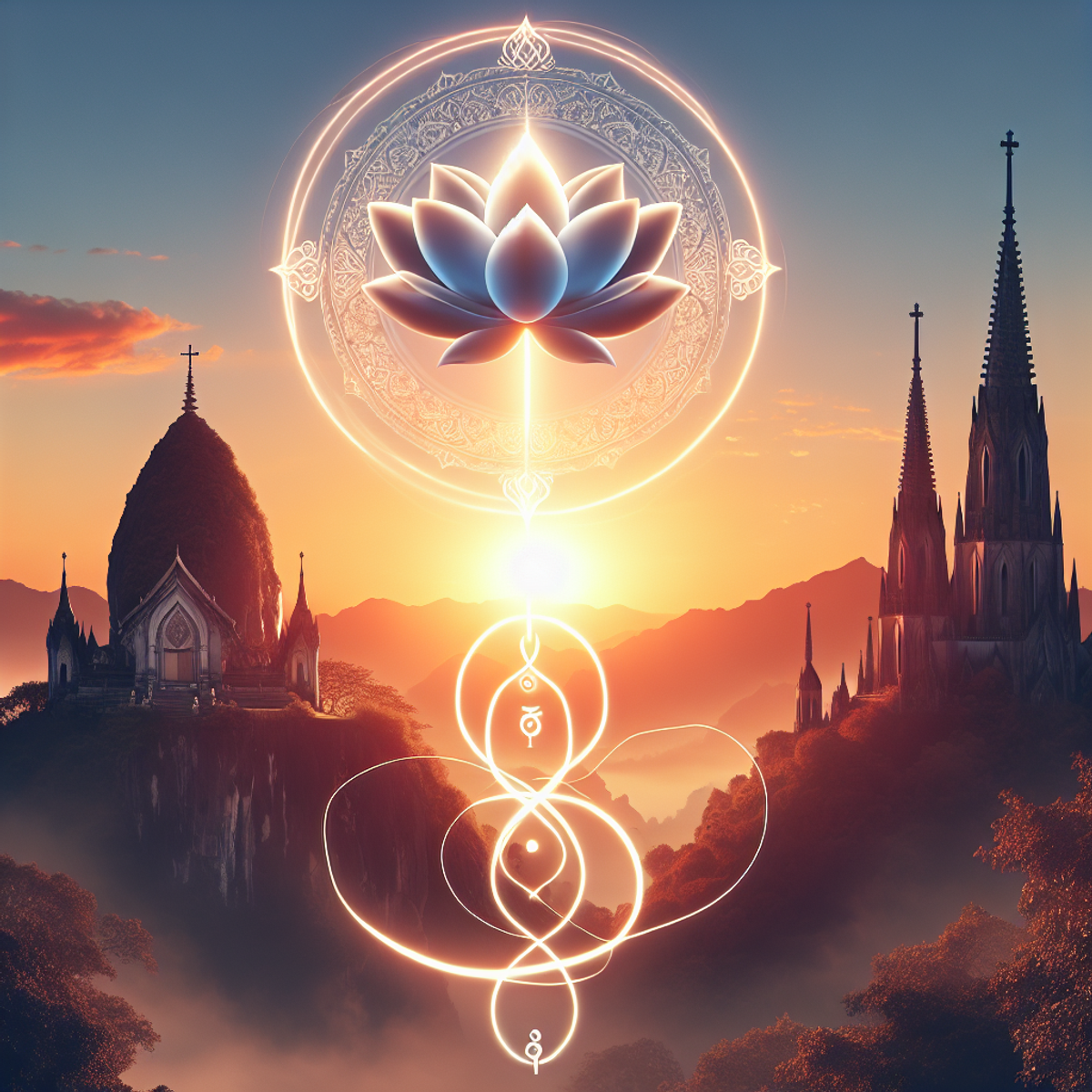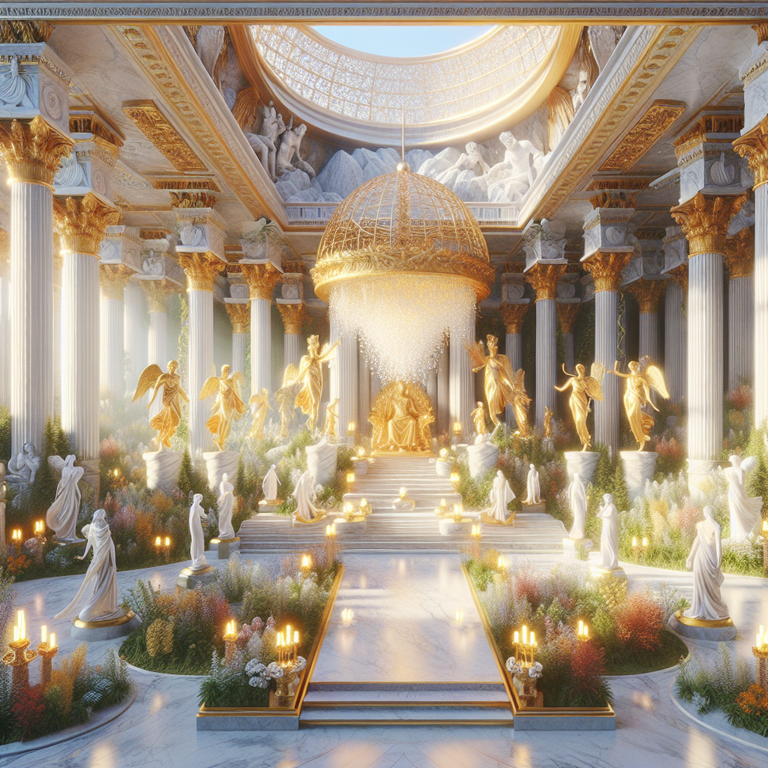FIND Spiritual MEANING in everyday life

Welcome to our blog, where we dive into life’s profound mysteries and timeless spiritual truths. Join us as we embark on a journey of self-discovery through deep contemplation, philosophical ideas, insights from various world religions, personal growth stories, and meditations on the human spirit. Our aim is to guide you in looking within, seeking wisdom, finding inner peace, and reflecting on the deeper meaning of existence. Get ready for a transformative experience of spiritual introspection. Let’s uncover the hidden treasures within ourselves together.
Unlocking the Spiritual Meaning: A Guide for Beginners
Introduction
Welcome, dear reader! Ever wondered about the term spirituality? It’s a word that carries a lot of weight and significance, isn’t it? The spiritual meaning of life, the universe, and everything can often feel like an elusive concept. It’s all about those deep feelings and beliefs that make us look beyond the surface level of existence.
Ever paused to think about how spirituality relates to you? It might be a curious question, a nagging feeling, or a deep-seated longing for something more significant. Yes, we’re talking about your personal journey to discover what does spiritual mean to you.
Here’s the deal: this article will serve as your guide on this exploration. We’re going to walk through various aspects of spirituality – its intriguing relationship with religion, avenues for personal exploration, impactful practices, and its profound connection to finding meaning in life.
Think of it as your map on this exciting voyage. You’re not just learning about spirituality; you’re also starting a conversation with your own spiritual self. And who knows what fascinating discoveries you might stumble upon along the way? So let’s dive right in and unlock the myriad dimensions of our spiritual experience together!
The Interplay Between Spirituality and Religion
When exploring the realm of spirituality, it’s inevitable to come across its historical counterpart, religion. Both spirituality and religion share a common goal of seeking understanding beyond the physical world, but they differ in their approaches.
Shared Foundations
Both spirituality and religion aim to:
- Answer life’s big questions
- Provide comfort in difficult times
- Foster a sense of belonging
- Offer moral guidance based on ancient teachings
Distinct Paths
However, they take different paths to achieve these goals:
- Religion often follows a structured framework with specific rituals, holy texts, and an organized set of beliefs.
- Spirituality is more fluid and individualistic, allowing people to find their own path and connect with their inner selves.
The Mystical Dimension
Within religious traditions, there exists a mystical dimension where seekers dive deeper in search of direct encounters with the divine:
- Christian mystics may describe experiencing an intimate connection with God’s love.
- Jewish Kabbalists seek hidden meanings within sacred texts.
- Islamic Sufis emphasize personal union with the divine through love and devotion.
The Essence of Spirituality
At its core, spirituality is about personal experience:
It’s where personal truth shines brighter than any preordained doctrine.
It’s an inner journey where:
- Every heartbeat can feel like a prayer
- Every breath can resemble meditation
It transcends rigid beliefs and external rituals, allowing individuals to discover their own unique spiritual path.
By acknowledging both their similarities and differences, we can see that spirituality and religion can coexist or exist separately in one’s life. As individuals navigating their spiritual landscapes, they may find themselves weaving between these interconnected realms.
Beyond Borders: Spirituality in Different Cultural Contexts
Spirituality, not bound by organized religion, is found in various cultural contexts. Let’s explore some key spiritual movements and their unique perspectives:
Transcendentalism
Arising in early 19th century America, Transcendentalism encourages individuals to trust their inner wisdom. Its main ideas include:
- Self-reliance: Relying on oneself for guidance and decision-making.
- Intuition: Believing in the power of intuitive insights.
- Connection with nature: Seeing nature as a pathway to the divine.
Theosophy
Rooted in mystical traditions from both East and West, Theosophy seeks universal truth by bridging science, philosophy, and religion. It suggests that all spiritual traditions share an ancient wisdom.
Buddhism
Buddhism teaches mindful and compassionate living, aiming for enlightenment—freedom from suffering through understanding reality. Key concepts include:
- The Four Noble Truths: Recognizing the existence of suffering, its cause, its end, and the path to its end.
- The Eightfold Path: Guidelines for ethical conduct, mental discipline, and wisdom.
Hinduism
Embracing a wide range of practices and beliefs, Hinduism focuses on righteous living (Dharma), spiritual practice (Yoga), and liberation (Moksha). It explores eternal truths beyond the material world.
These movements all share a common goal of seeking truth and enlightenment. They remind us that spirituality is a universal pursuit that transcends borders, offering diverse perspectives on what it means to live a meaningful life.
Personal Reflection: Nurturing Your Spiritual Connection
Embarking on a spiritual journey is like creating your masterpiece; it’s deeply personal and reveals your inner sense of aliveness. But where should you begin? What does it mean to have a personal definition of spirituality?
Cultivate Authenticity in Your Spiritual Practice
Listen to Your Heart
Start by listening to the whisper of your own heart. What are the beliefs and values that resonate with you at your core?
Define Spirituality for Yourself
Think about what spirituality means to you personally. Is it finding peace within, connecting with nature, or exploring the mysteries of the universe?
Embrace Individuality
Remember, there is no one-size-fits-all approach. Just like a fingerprint, your spiritual path is unique.
Reflective Exercises to Deepen Your Awareness
Mindful Moments
Take time each day for reflection. Perhaps it’s a few minutes of silence in the morning or journaling about experiences that move you.
Question and Explore
Ask yourself thought-provoking questions. What moments today felt sacred? When did I feel most connected to myself or others?
Understanding Your Relationship with God
Diverse Interpretations
The concept of God varies greatly across spiritual and religious landscapes. How do you perceive this presence in your life?
Open Dialogue
Engage in conversations with others about their understanding of God. Notice the vast spectrum of belief and experience.
Personal Connection
Reflect on how you experience divine connection. It could be through prayer, nature, art, or even the laughter of loved ones.
By honoring your unique experiences and understanding, you carve out a personal relationship with spirituality that is as individual as you are. Whether you find divinity in a sunset, the pages of ancient texts, or in acts of kindness, it’s this personal exploration that enriches your spiritual fabric.
Pathways to the Transcendent: Exploring Spiritual Practices
Cultivating a rich spiritual life often involves dedicated practices that offer a bridge to transcendent experiences and heightened states of consciousness. Let’s draw our attention to some of these powerful practices such as meditation, prayer, and yoga.
Meditation
Meditation, a time-honored practice, navigates the pathway to inner peace. By focusing on the breath or a particular mantra, you can cultivate mindfulness, bringing you closer to your authentic self.
Prayer
Prayer, another potent practice, offers a direct line of communication with the divine. Regardless of your religious or spiritual beliefs, prayer can manifest as a heartfelt conversation with a higher power, an expression of gratitude, or even silent contemplation.
Yoga
On the other hand, yoga integrates body, mind, and spirit in harmony. This ancient practice helps us experience our inherent connection with the cosmos through physical postures (asanas), breathwork (pranayama), and moral codes (Yamas & Niyamas).
These spiritual practices are more than isolated activities; they can be woven into the fabric of our daily lives. Engaging in mindful activities like mindful eating or walking, or setting up intentional rituals such as lighting a candle before meditation or creating a sacred space in your home, can bring spirituality alive in every moment.
Remember this journey is yours. No two paths are identical; what matters is authenticity and intentionality. Feel free to experiment, and explore various practices until you find what resonates with you most deeply.
- Will you create a morning ritual that sets the tone for your day?
- Can you incorporate more mindfulness into everyday chores?
- How might yoga enhance your connection with your body and spirit?
The answers lie within you; all it takes is time and exploration.
The Evolution of Spirituality: From Ancient Wisdom to Modern Expressions
It’s fascinating to see how spirituality has changed over time. Our ancestors had a strong connection with nature and saw the divine in everything around them. Today, many people are trying to reconnect with that same sense of wonder and find solace in nature.
Ancient Wisdom: Finding the Sacred in Nature
In ancient times, spirituality was deeply rooted in nature. People believed that everything in the natural world had a spiritual essence, and they honored and respected these forces. Some key aspects of ancient spirituality include:
- Seeing the divine in rivers, mountains, and celestial bodies
- Rituals and ceremonies to connect with the spiritual realm
- Belief in mythical beings and deities associated with natural elements
Modern Expressions: Exploring Spirituality through Art
Art has always been a powerful tool for expressing spiritual experiences. From ancient cave paintings to grand religious masterpieces, artists have used their creativity to capture glimpses of the divine. Today’s artists are no different, using various mediums to convey their own mystical encounters.
The Rise of Individualistic Spirituality
As society has progressed, spirituality has become more personalized. Instead of following strict religious doctrines, many individuals now create their spiritual path by combining ideas from different traditions. This shift towards individualistic spirituality allows people to explore what resonates with them.
Benefits of Embracing Diverse Spiritual Practices
By embracing diverse spiritual practices, we can:
- Gain a broader perspective on life’s big questions
- Find connections between seemingly different belief systems
- Foster tolerance and understanding towards others’ spiritual journeys
With this understanding, we can appreciate the unique ways in which people seek meaning and purpose in their lives.
Finding Meaning Through the Spiritual Lens
Spirituality, whether it’s modern or traditional, helps us see our lives in different ways. It adds colors to our experiences, showing us moments of happiness, sadness, and the search for purpose. It’s not just about following rituals or rules; it’s about finding connection and meaning, things that seem to be a natural part of life.
Interpreting Life Experiences
Everyone’s spiritual journey gives them a special way of looking at things that happen in their lives. For example:
- Feeling extremely grateful when something good happens
- Believing that there’s always something to learn from difficult times
Spirituality gives us a framework for turning ordinary things into something special and making daily experiences more meaningful.
Personal Narratives
Let’s think about these two stories:
- Sarah discovers her true passion while helping people in faraway places. She feels a deep connection to something bigger than herself.
- John finds moments of peace and clarity in the middle of a busy city through his meditation practices.
These stories show us how individuals find the spiritual insights that help them navigate through life’s ups and downs.
As we explore our spiritual connections in the next section, think about these stories and how your own experiences might be influenced by the way you see things spiritually.
Embracing the Sacred Unknown: Spirituality in Times of Uncertainty
Life can feel like a roller coaster ride, filled with thrilling highs and daunting lows. But here’s the catch – it’s in these very moments of existential crisis and transition that spirituality shines as a beacon of solace.
Finding Comfort in Spirituality Amidst Chaos
Have you ever been in a situation where conventional answers just don’t cut it? That’s when you turn to your spiritual compass. It guides you through the thick fog of uncertainty, helping you find ground even when the terrain seems unfamiliar. Your connection to the sacred and transcendent can yield insights that defy logical explanation.
“When everything seems to be going against you, remember that the airplane takes off against the wind, not with it.” – Henry Ford
The Power of Spiritual Practices in Navigating Turbulent Waters
Let’s take a moment to picture this: You’re at a crossroads, unsure which path to take. Instead of succumbing to anxiety, you lean into your spiritual practices. Maybe you meditate, pray, or simply sit in silence, tuning into the whispers of your inner wisdom. Suddenly, what seemed like an insurmountable challenge morphs into an opportunity for growth.
The truth is, our spiritual journey is not a straight line; it’s more like an ever-evolving spiral. This journey invites us to explore uncharted territories within ourselves with curiosity and openness. So next time life throws a curveball your way, remember this:
Embrace the Sacred Unknown; It’s Where Transformation Happens!
“The cave you fear to enter holds the treasure you seek.” – Joseph Campbell
Conclusion
Embarking on the personal evolution of spirituality is like unfolding a map to our inner worlds, revealing paths and landscapes full of meaning and the sacred. This journey transforms us, offering new perspectives on our existence, our joys, sorrows, and everyday moments. It calls to us, promising depth and connection beyond the surface-level busyness of life.
Let your heart be inspired to nurture this quest, embracing each day with curiosity and awe at the mysteries waiting to be uncovered. As we pay attention to the subtle messages of the divine that are present in our everyday lives, we are reminded that every step we take is part of an extraordinary adventure—a dance with something greater.
The invitation remains: keep exploring, growing, and cherishing this deep relationship with spirituality. With each breath and each heartbeat, may you sense the power of something larger flowing through you, guiding you toward new possibilities.












